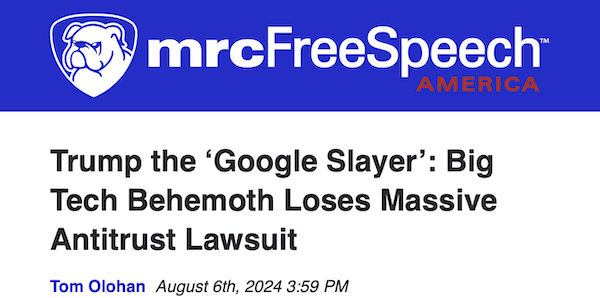We’ve already documented some of the bogus, politically motivated attacks the Media Research Center made against Google throughout the 2024 election season. It continued in other ways as well by repeatedly hammering on its discredited “censorship” narrative as well as promoting supposed victimhood among its fellow right-wingers. A sampling from earlier this year:
- Google Censors Magazine for Daring to Publish Anti-Islamic Terror Content
- Hard to Believe: Google Spreads Climate Propaganda on Earth Day
- Silly Us: Google Regurgitates Typical Excuse After Slashing MAGA Ad
- BLACKLISTED? Guess Why Google Just Booted PragerU Out of Its App Store
- Google Coughs Up Lame Excuse As It Backtracks PragerU Ban
- Tucker Carlson Gets Candid on Google Censorship and News Manipulation
- Rumble CEO Exposes Vid of Google Exec Giggling Over Search Engine Bias
- Pro-Lifer Challenges Google with FL Free Speech Law
- Major Tech CEO Rebukes Google’s Monopoly, Announces New Lawsuit
- WATCH: David Marcus Blasts Google as Not a ‘Neutral Arbiter’ on MRC UnCensored
Catherine Salgado trotted out the MRC’s favorite discredited anti-Google activist in a May 31 post:
Google researcher Dr. Robert Epstein gave the Texas State Senate a crash course in the nefarious election interference that Big Tech has been using to manipulate U.S. politics for years.
Epstein told the Texas State Senate Committee on State Affairs Wednesday he identified “ten new forms of influence that the internet has made possible and that are controlled exclusively by Big Tech companies.” He labeled them “among the most powerful forms of influence ever discovered” and more “dangerous” as they are nearly “invisible to users.” According to Epstein, “Our great nation unknowingly turned over its elections to Big Tech companies in 2012” and the “2020 presidential election was only one of hundreds of elections that Google has flipped.” This year, Epstein predicted, Google could shift between 6.4 and 25 million votes, and YouTube recommendations alone could alter users’ opinions by 40 percent or more. The demographic most vulnerable to this kind of manipulation are moderate Republicans, according to Epstein.
Epstein then offered solutions on “how to make Google and other companies accountable to the public.” Specifically, he suggested declaring “[Google’s] index, a database they use to generate their search results, to be a public commons.” He added, “Second method is you set up a large-scale system that will preserve and analyze the actual data that these companies are sending to real users. In other words, to track them—to do to Google what they do to us and our children 24 hours a day.”
We’ve documented how Epstein’s previous attacks on Google have been discredited for making sweeping conclusions of Google’s purported bias based on a very tiny data set of 21 voters.
Meanwhile, an Aug. 6 article by Tom Olohan tried to credit Donald Trump for a court ruling against Google in a federal antitrust lawsuit a day earlier because the court case began “while Donald Trump was still president,” even though it had broad support.
A Sept. 11 article unironically touted Republicans attacking Google for a different reason:
The head of the House Judiciary Committee is investigating a potentially major conflict of interest between a lead defense attorney for censorship giant Google and Democratic presidential nominee Vice President Kamala Harris.
House Judiciary Chairman Jim Jordan (R-OH), wrote a scathing Sept. 10 letter to U.S. Attorney General Merrick Garland as part of his ongoing investigation into the extent to which the Biden-Harris administration “coerced or colluded” with Big Tech to censor Americans. Jordan specifically called for an explanation as to why the lead for Google’s defense team Karen Dunn was reportedly prepping Harris for her debate with former President Donald Trump while simultaneously representing the Big Tech giant in the Department of Justice’s major antitrust lawsuit against it.
The debate between Harris and Trump occurred Tuesday night on ABC News. As Jordan noted, “This apparent conflict of interest raises serious concerns about whether Dunn’s relationship with key figures in the Biden-Harris Administration creates a conflict of interest that could inappropriately bias the Department’s approach in United States v. Google LLC.”
By contrast, the MRC has completely censored the fact that Elon Musk colluded with the Trump campaign to censor the Vance dossier and engage in other election interference.
